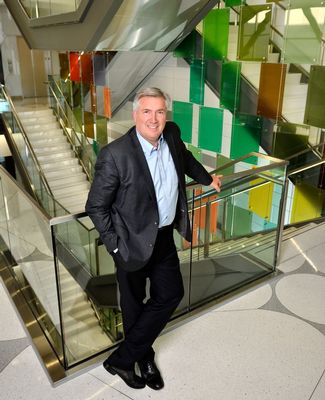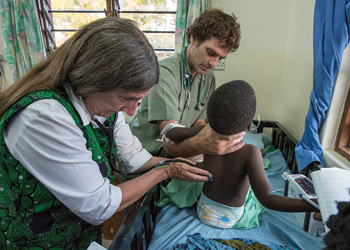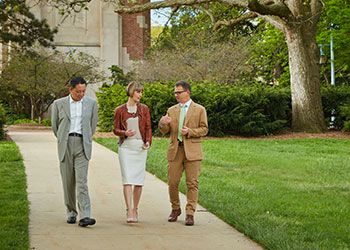Having the Right Tools
Christopher Contag leads Biomedical Engineering at MSU and is the James and Kathleen Cornelius Chair.

Having the Right Tools
Christopher Contag leads Biomedical Engineering at MSU and is the James and Kathleen Cornelius Chair.
November 17, 2017When Christopher Contag arrived at MSU from Stanford, it was to take on a brand new position, in a brand new department, in a brand new building—a challenge he’s taking in stride.
An internationally known biomedical researcher who was previously a professor in Stanford’s departments of Pediatrics, Radiology, and Microbiology & Immunology, Contag became the inaugural director of MSU’s Institute for Quantitative Health Science and Engineering and the chairperson of the new Department of Biomedical Engineering within the College of Engineering in late 2016.
Contag was also recently named the James and Kathleen Cornelius Chair. James Cornelius (’65, MBA ’67) was chairman of the board and CEO of Bristol-Myers Squibb and previous CEO of Guidant Technology. He and his wife, Kathleen, have been involved in the New York and Indianapolis arts and philanthropic communities.
In his role, Contag has assembled teams of researchers in engineering, basic science, and medicine together under one roof—the new Institute for Quantitative Health Science and Engineering—to solve some of the most pressing issues in health care.
Specifically, Contag and his team are focusing on understanding biological processes, then using that understanding as the basis to create methods for early diagnosis and develop precise, individualized therapies to cure and prevent disease.
It’s a concept researchers are calling “precision health.”
“If we’re treating disease, then we’re always behind the eight ball. We’re stuck behind the disease already being there,” Contag said in a recent conversation on the Spartan Podcast with President Lou Anna K. Simon and Athletics Director Mark Hollis. “But what if we could detect it early? What if we could detect a cancer when it was at a 100-cell stage? That’s not disease; that’s health. If we can maintain health, then we can better treat diseases and prevent them.”
“We’re also developing new technologies for therapy, like a way of treating cancer with a patient’s own immune cells. And I think we can now begin to think about the concept of treating cancer in a curative way,” Contag adds.
At the 2017 Investiture program celebrating faculty newly installed in endowed chair and professorship positions, Contag was the featured faculty speaker. He noted: “They (these faculty) are passtionate about seeing students discover something new for the first time, about creating new knowledge about our world, learning from our past, gaining new insights into biological processes, or engineering a new device or a new way of doing things. They do it for the love of scence, the love of knowledge, and the challenge of enriching young minds and improving humanity.
“By supporting these faculty, we are investing in knowledge from the past that informs the future. We are ensuring the health of the planet and the longevity of our people. We are improving food production and the way we distribute resources. There is no fund in the world that will give you a better return on your investment,” Contag said.
Endowed positions like the James and Kathleen Cornelius Chair allow MSU to provide researchers like Contag with ongoing financial resources to further their work, publish their findings, travel to conferences, or pursue special projects. These incentives can be a powerful tool for recruiting and retaining the best faculty, whose work helps MSU remain a competitive force among other universities and research institutions on a global scale.
Having researchers like Chris Contag doing work of this magnitude right here at MSU is evidence of that.




